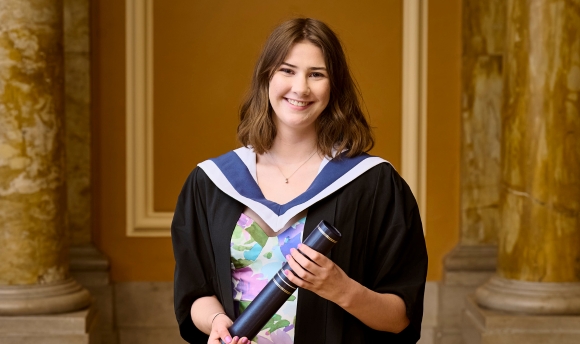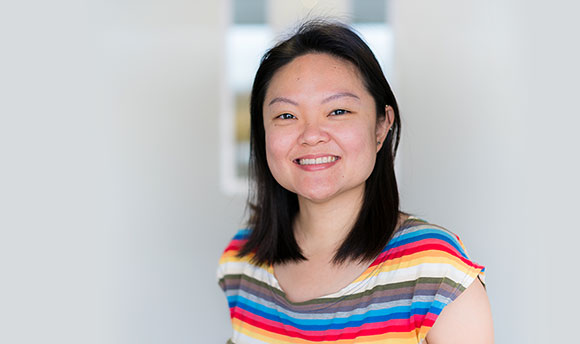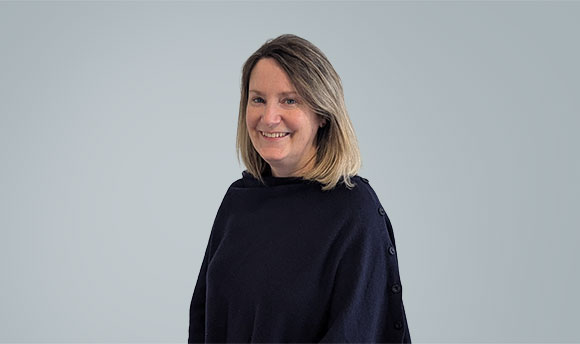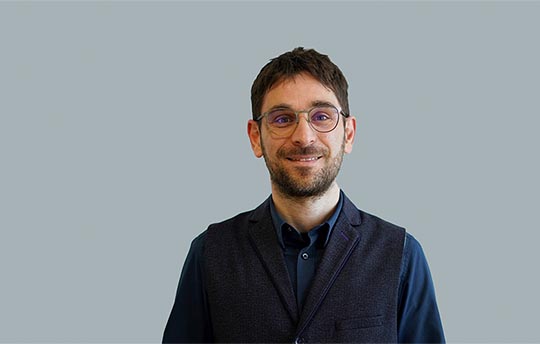This course is now closed for applications for September 2025. Applications will open later in the year for September 2026 entry.
Music Therapy - MSc
Are you interested in how music can facilitate relationship, community, health and wellbeing?
This established MSc in Music Therapy at QMU is the only music therapy course in Scotland. It offers stimulating and varied learning experiences, including practice placements in various settings that will be central to your learning.
The course can be the first step to an exciting and rewarding career. It will qualify you to register with the Health & Care Professions Council (HCPC) and work as a music therapist in only two years.
Please note that this course is going through a routine review process over the next year and that any changes to course content arising will be reflected on this web page.
Why QMU?
- Stimulating learning environment: The course is based in our School of Health Sciences and offers a stimulating learning environment with a practical focus. Your learning will be enriched by the interdisciplinary structure of the course as you study alongside your peers from various other pathways within QMU, including the MSc Art Psychotherapy and MSc Dramatherapy.
- Practice-based learning experience: You’ll benefit from opportunities to work in a variety of settings.
- Professional accreditation/registration: Students are advised to join The British Association for Music Therapy (BAMT) and graduates are eligible for registration with the Health & Care Professions Council as Registered Arts Therapists (Music).
- Experienced programme team: The programme team of six are music therapists and researchers, as well as music therapy educators.
On this course you will learn about a variety of approaches to music therapy. With a strong emphasis on psychodynamic theory, you will be equipped to work in a person-centred way with people with a wide range of needs.
Studies will focus on the following areas:
- Therapeutic musical skills, with an emphasis on improvisation, interaction and application in a therapeutic context
- Psychological, developmental, and music therapy theories
- Different persons and contexts
- Self-development
- Observation and critical thinking skills
- Professional issues, such as ethics and multi-disciplinary working
- Research, assessment and service evaluation
Before embarking on the course, we would recommend some music therapy texts such as:
Music Therapy
Rachel Darnley-Smith and Helen M. Patey (Sage, 2003)
Music Therapy: An Art Beyond Words
Leslie Bunt and Brynjulf Stige (Routledge, 2014)
Relational Music Therapy: An Intersubjective Perspective
Gro Trondalen (Barcelona Publishers, 2016)
An Introduction to Person-Centred Practice: Person-Centred Practice in Nursing and Healthcare; Theory and Practice
Eds. Brendan McCormack and Tanya McCance (Wiley Blackwell, 2017)
These texts offer an introduction to critical theory and intersectionality:
Disability and Other Human Questions
Dan Goodley (Society Now, 2021)
Learning from my Daughter
Eva Kittay (Oxford University Press, 2019)
The Race Conversation
Eugene Ellis (Confer, 2021)
Intersectionality in the Arts Therapies
Eds. Jessica Collier and Corrina Eastwood (Jessica Kingsley Publishers, 2022)
The following titles introduce psychodynamic theory and thinking:
Communicative Musicality: Exploring the Basis of Human Companionship
Stephen Malloch and Colwyn Trevarthen, Editors (Oxford University Press, 2009)
Forms of Vitality: Exploring Dynamic Experience in Psychology, the Arts, Psychotherapy and Development
Daniel Stern (Oxford University Press, 2010)
Practitioner Research in Counselling and Psychotherapy: The Power of Examples
Eds. Liz Bondi and Judith Fewell (MacMillan Education, 2016)
Mentalizing in Arts Therapies
Marianne Verfaille (Routledge 2018)
This text is useful for those new to or returning to academic study:
How to Fix your Academic Writing Trouble
Inger Mewburn, Katherine Firth and Shaun Lehmann (Open International Publishing, 2019)
The Open University also offer a 'Succeeding in Postgraduate Study' course which introduces master's level academic study.
The following online journals are open access and offer a varied source of up-to-date research, practice and thinking in music therapy and broader interdisciplinary contexts:
Structure and exit awards
You must complete the full MSc (200 credits) to be eligible to register with the Health & Care Professions Council and to work as a music therapist. You can exit at different points but single module study is not available.
Teaching, learning and assessment
Teaching includes practical and academic elements with an emphasis on experiential and interpersonal learning and teaching methods, including lectures, seminars and tutorials.
Practice education is supported by regular supervision at QMU. Students are not required to cover the cost for supervision at University or on placement.
Assessments are varied and include practical, presentation and written formats. Personal development is fundamental to therapeutic training, and it is a requirement of the HCPC that students attend regular personal psychotherapy throughout the course - at QMU you are required to attend a minimum of 40 hours. Personal therapy is not assessed, and students are required to cover the cost.
Practice-based Learning (Placements)
Practice-based learning is ongoing throughout the course. In year one, your placement is usually with a music therapist, one day per week from October through to March. In year two, you attend practice-based learning two days per week throughout both semesters and work in a more autonomous way.
The range of practice-based learning is extensive including placements within hospitals, schools, voluntary sector organisations, child and family centres, drug and alcohol services, hospices, community-based health centres, community-based mental health teams, day centres for the elderly and for adults with physical and/or learning disabilities. The range of practice placements for Music Therapy students changes from year to year.
Practice-based learning can also be arranged further afield if students choose to commute; the course has excellent partnerships with practice education providers across the UK and Ireland, Students do not need to find their own placements: practice placements are organised by the Professional Practice Tutor at QMU.
Teaching hours and attendance
Each module requires attendance of classes at QMU: typically, year one students attend QMU on Tuesdays and Wednesdays and in year two, classes are on a Thursday. Practice placement days and independent study are in addition to this.
Class sizes
There are typically 25 places for each cohort.
Teaching staff
You can read more about the teaching staff on this course at the bottom of this page. Please note that teaching staff is subject to change.
The MSc Music Therapy course sits together with MSc Art Psychotherapy, MSc Dramatherapy and MSc Play Therapy as an arts therapies pathway within QMU.
You will study the following modules:
Year One
- Practice-based Learning 1 (40 credits): This module introduces you to music therapy through placement preparation, practice placement and supervision seminars on campus.
- Developmental and Relational Perspectives (20 credits): This module introduces you to developmental theories and theories from psychotherapy that have informed the practice of the arts therapies. It also introduces different research methodologies and the applicability of different research methods in practice.
- Therapeutic Practice and Resources (20 credits): This module focuses on developing your practice as a music therapist. Through experiential learning with your peers coupled with self-led exploration, we invite you to explore how theory and practice in music therapy inform what you do (with persons in music therapy sessions).
- Theory and Practice of Person-Centred Health and Wellbeing (20 credits)
- Leading Person-Centred Practice for Health and Wellbeing (20 credits)
Year Two
- Practice-based Learning 2 (40 credits): This module encompasses your weekly practice placement in a particular setting and supervision seminars on campus.
- Arts Therapies in Context (20 credits): This module focuses on the relationships between contexts and practice and creates space for you to work individually, with your music therapy group and peers from art and dramatherapy, to further develop your understanding of psychodynamic thinking through arts-based processes and broaden thinking further.
- Dissertation (60 credits): The aims of this module are to develop and apply your skills of research and enquiry to a self-selected topic. Through fostering academic integrity, the module strengthens your critical understanding and scholarly pursuit within music therapy, which includes an awareness of and reflexive attitude towards contemporary developments in the field, new emerging literature and research. There are 5 different options to the Dissertation module: Practice-based project, Literature review, Empirical study, Portfolio thesis, and Arts-based thesis.
Music therapists work across health, education and community sectors, in hospitals, schools and care homes for example. Many graduates work for others but others have become successful freelance practitioners.
Our graduates have a high level of employment with some students creating a post from their practice placement in year two.
Employment opportunities vary, with some regions of the UK offering more employment possibilities for qualified music therapists than others.
As a student on the course, you will be offered classes with the Careers Adviser for the School of Health Sciences, to help explore careers options and think about how to approach employment upon graduation. At the end of the course you will be invited to a ‘preparing for work’ day which includes conversations with former graduates, mock interviews and business advice.
We are currently undertaking a study to hear from graduates about their employment, and specifically to learn how our placement model (of second years practicing in settings without a music therapist) is impacting on new music therapy posts and generating employment opportunities.
There is a strong alumni community at QMU, and we always like to hear from our graduates. They are invited back to our student conferences and have opportunities to contribute to the programme, to talk about their work in the ‘prepare for practice day’ for example.
Entry requirements
We welcome enquiries and applications from people interested in how music, persons and health interact.
Applicants usually hold an honours degree or a comparable professional qualification. Valuing music in your own life, and showing an interest in what music can offer in relationship with others, is important.
We are interested in flexible musicianship and a fundamental ability to listen openly to your own and others’ music. You do not need to be able to read Western musical notation, hold musical grades, or play specific instruments. We are committed to enabling and widening access for musicians from all backgrounds.
Having at least one year’s experience of relevant work experience with persons in the community, education or health settings is also important. Lived experience is a huge asset; please get in touch with the team if we can do anything to support you in applying.
The course is intentionally demanding and will stretch you in personal, musical, and theoretical ways. We imagine you will be able to reflect constructively, have strong self-awareness, an interest in music and people, and a curiosity about yourself.
Disability/Health conditions
If you have a disability, long-term physical or mental health condition, or learning disability, it should not stand in the way of your studying at QMU. However, if you are not sure whether your disability might be a barrier to your studies please contact the disability service who will be able to have a conversation with you about supports available to you.
The application process
You are asked to include several documents with your application. You will be invited to complete a personal statement which should include reasons you feel drawn to music therapy at this time in your life and why the particular approach taught at QMU appeals to you.
Please make reference to any resources about music therapy you have encountered. We would also like to hear about your own relationship with music and how this has shaped your decision to apply. Please tell us about your experience within caring professions (which does not need to be music related) and highlight what you feel you would bring to the course.
For international applicants who do not have a degree in English, you will be required to provide evidence of English language competency with an average score of IELTS 7.0, with individual components not scoring less than 6.5.
Applications are reviewed by members of the course team. If you meet the entry requirements, you will be invited to a creative conversation. If you are not invited to a creative conversation, you will be sent feedback so that you can improve your application for another time.
What is a creative conversation?
The programme team are keen to enable a dialogic process that enables a shared decision about studying music therapy at QMU.
Your creative conversation with one of the programme team is exactly that: a conversation with space for you to share what music means to you. You might, for example, play or sing an original composition/song, a piece that is meaningful to you, or an improvisation on a theme.
Through our conversation, we want to make sure together it’s the right course at the right time for you.
The creative conversation happens online via Microsoft Teams, so that it is the same experience for everyone regardless of where you are based at the time. The timings for our conversations will be considered in relation to your local time but if the timing doesn’t suit, please get in touch with the team.
Come to campus days
As our creative conversations are online, we offer ‘come to campus’ days at different times in the year so that you can have a look around the University, meet with the programme team and have lunch with current students. When you receive an invitation to a creative conversation you will be given details of these days, however coming along to one is not compulsory or a requirement for entry.
‘Come to campus’ days happen in addition to QMU’s online/campus open days.
Other requirements
A satisfactory criminal records check from the Protection of Vulnerable Groups (PVG) Scheme, an occupational health check and personal indemnity insurance are required.
Other costs
- The cost of the occupational health check, PVG check and the cost of professional indemnity insurance is the responsibility of the student. For more information on this, visit the PG 2025 fees page on our website.
- The additional costs associated with placement travel and accommodation are the responsibility of the student. We aim to match students to placements that make geographical sense to keep costs to a minimum for you, as travel to placement is also an additional cost.
Applying for this course
For more information on applying, or to apply for this course, please follow the links in the 'Start your application' box at the top right of this page.
Application deadline
This course is now closed for applications for September 2025. Applications will open later in the year for September 2026 entry.
In general, the course will remain open until capacity has been reached, specifically we tend to close to new applications in April, but this can vary year on year.
We advise everyone to apply early to be considered because the course fills up on a first come first served basis. When we run a waiting list it is often dynamic and moves quickly.
Contact the Music Therapy team, contact Dr Philippa Derrington (Programme Leader) or contact Admissions
Does QMU have Open Days?
Yes. These are both on campus and online and provide an opportunity to speak with the programme team and meet with current students from the MSc Music Therapy. Please check the Postgraduate Open Days page for forthcoming dates.
How do I apply?
Applications are made online. Please click the ‘Apply to this course’ button on the top right of this page.
When should I apply?
Applications can be made from October of each year for the following September. Applicants are advised to apply as soon as possible because places fill up on a first come first served basis. If your application is successful, and the course is full, you will be offered a place on a waiting list.
What is the mode of attendance?
Please refer to the 'How will I be taught?' section above for details on mode of attendance.
Can I work at the same time?
We understand that you might need to work during the programme so attendance at University and practice placement is part-time (total 3 days/ week in each year). As it is a full-time master's you are expected to engage in independent study (equivalent of 2 days/week) in addition to the teaching days, but this can be flexible to suit your schedule.
Can I do the course by distance-learning?
Some aspects of the course can be studied online and there is much self-directed study. However, attendance at University is compulsory on the teaching days due to the necessity of interpersonal and experiential components.
Is there a part-time route to MSc Music Therapy?
There is no part-time route. It is offered as a full-time 2-year, fast-track pre-registration (HCPC) course however it is designed to be as flexible as possible, requiring only 3 days/week attendance.
Who organises practice placements?
Practice Placements are arranged and allocated by the Professional Practice Tutor at QMU. Students are not expected to find their own placements. Before year one and two, you are invited to complete a form to indicate previous experience, any relevant information and, importantly, your address during semesters. Wherever possible, practice placements are arranged in, or near to, the area where you live but this is also balanced by learning needs and student preferences, which are all taken into consideration.
What kinds of practice placements are offered?
The range of practice placements are extensive including placements within hospitals, schools, voluntary sector organisations, child and family centres, drug and alcohol services, hospices, community-based health centres, community-based mental health teams, day centres for the elderly and for adults with physical and/or learning disabilities.
Who supervises practice placement?
In year one, all students are usually supervised by a music therapist who works on-site. In year two, students have the opportunity to work more autonomously and often in a setting where there has previously been no Music Therapy. They are supervised by another professional who works in the setting.
All students attend regular small supervision seminars at University throughout the 2-year programme, alongside their practice placement. Attendance to these is a co-requisite of practice placement and supervision is not an additional cost to this course.
When should I start personal psychotherapy?
Students are required to attend personal therapy for the duration of the MSc Music Therapy course (as all HCPC registered courses in the UK) and to show evidence of attending at least 40 hours in total Responsibility for finding a therapist rests with the student but tutors will support students in this process where necessary. It is recommended that this is in place for the start of the course.
In general students are advised to work with a therapist whose orientation is compatible with the psychodynamic orientation of the course, with a minimum of 5 years’ experience, and registered with UKCP or BACP. Further details are provided in the Programme Handbook which is sent to students before the course begins.
What are the course fees?
Information on fees and possible student funding can be found on our Fees and Funding page.
Are there any other costs?
It is important to bear these additional expenses in mind
- Fees for personal therapy.
- Personal indemnity insurance. The HCPC requires that all music therapists, including trainees, have this in place.
QMU name badge for practice placements. This is a one-off payment, usually about £6. - Fee for occupational health check. This is a requirement for all students within the School of Health Sciences and is organised by QMU.
- Travel costs for placement. This can be covered if you have been resident in Scotland for at least 3 years.
There are no additional supervision costs for this programme.
Are there grants, trusts or scholarships for the course?
There are no grants available but international students can apply for a QMU scholarship. Some students have sought funding from other sources by consulting information on Education Awards in their local library. Other students have obtained a Career Development Loan from their bank or received part funding from their employers. For information on student loans (eg from SAAS), see our Funding website.
What sort of tutorial support is available to students?
Each student on the course has a Personal Academic Tutor (PAT). The role of the Personal Academic Tutor is to help students integrate the different parts of the course, review their work and be aware of any circumstances affecting the student’s learning on the course. Students meet with their Personal Academic Tutor every week for a supervision seminar group and at least once each semester individually.
Is there support within University for students with disabilities?
Clare Gillespie, a member of the programme team, is our academic disability student coordinator. She will meet with students to discuss requirements and offer advice in liaison with the academic disability services.
Is there help with writing?
The team within the Effective Learning Services at QMU offer workshops for all students and on every aspect of academic study, including essay preparation. Tutorials are also offered for students whose first language is not English.
How many students are in each cohort?
There are up to 25 students in each cohort however improvisation workshops, supervision seminars and other tutorials are in small groups.
Do most students find employment after they graduate?
Please refer to the 'Career Opportunities' tab above for details on employability.
What are the research interests of the staff?
Read more about the staff in the Occupational Therapy and Arts Therapies Division.
How do I find out more about Music Therapy?
Join the British Association for Music Therapy (BAMT) or follow their social media channels:
- British Association for Music Therapy X/Twitter
- British Association for Music Therapy Instagram
- British Association for Music Therapy Facebook
Come along to an event hosted by the Scottish Music Therapy Trust or sign up to receive emails from smtt@hotmail.org.uk. Follow their social media channels:
- The delivery of this course is subject to the terms and conditions set out in our 2025/26 Entry - Terms and Conditions (Postgraduate).
- The information outlined here is correct at the time of posting (October 2024) but the course is due for re-validation in May 2025 and will likely result in some changes for entry for September 2025 entry. In the event that the course does change, QMU will seek to use reasonable endeavours to ensure that there is no detrimental impact on students. Please check back here for updates.
Interview with Ann Lee
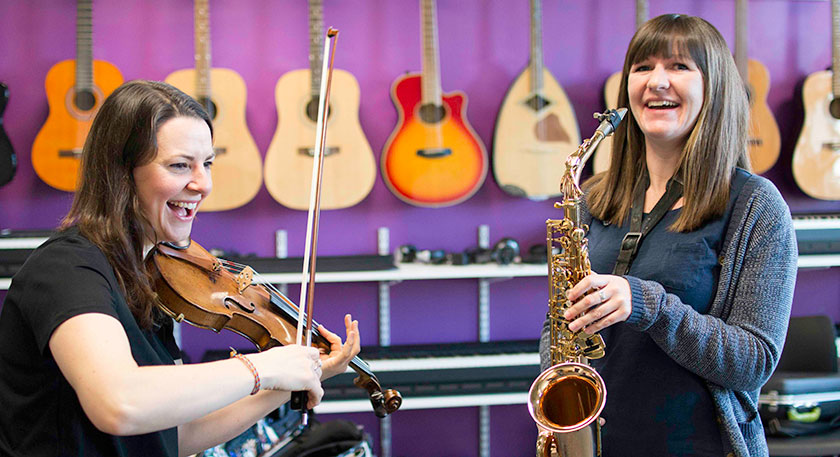
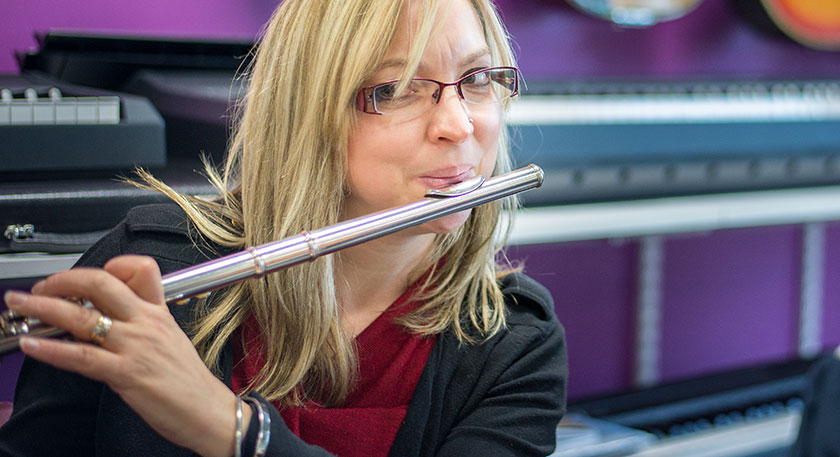
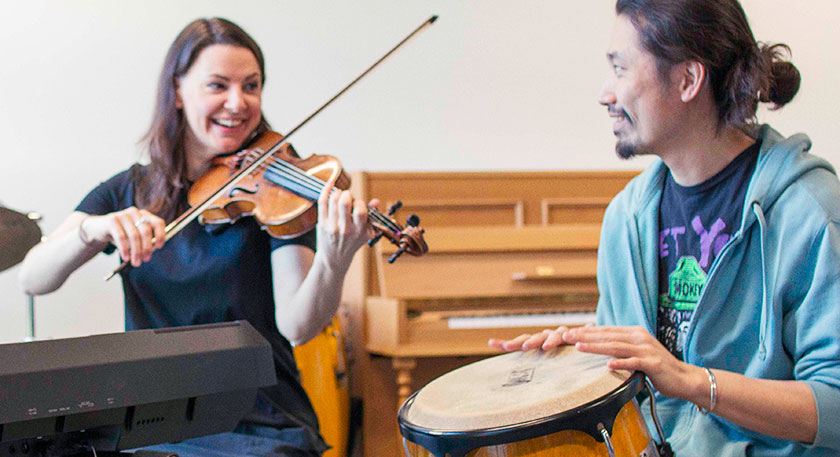
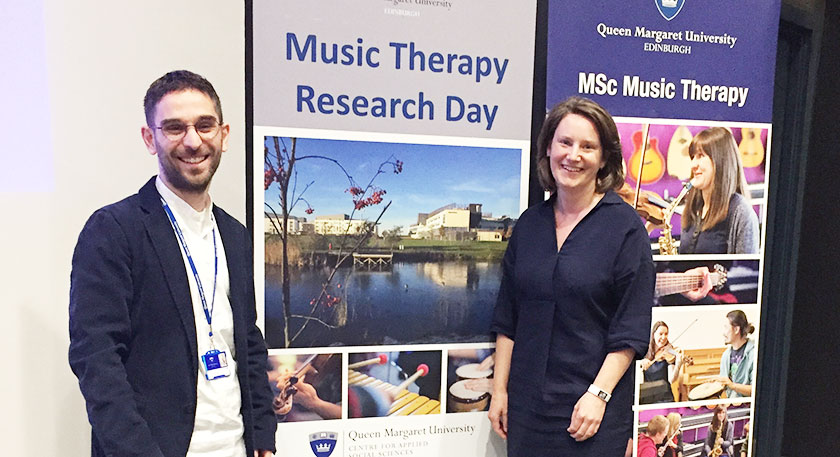
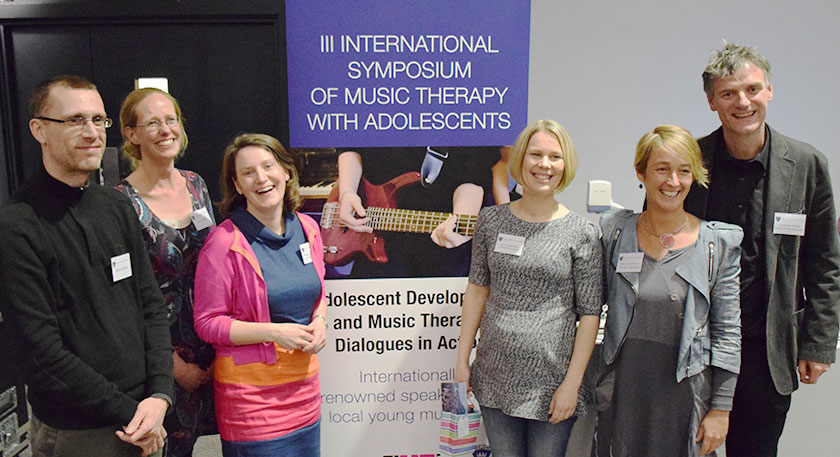





Start Your Application
Course Overview
Engage with the Team
A Student Story
".... I feel that the combination of practice placements, alongside lectures and practical music workshops, allow for quite a well-rounded education and prepares me for employment right after graduation."
Read my storyJoin us at one of our Postgraduate Open Events
Find out about online and in-person opportunities to meet with us to find out more about our postgraduate courses and study at QMU.
Postgraduate Open Events - More Info and BookingsCourses You Might Also Like
- MSc Art Psychotherapy
- MSc Audiology (Pre-Registration)
- MSc Diagnostic Radiography (Pre-Registration)
- MSc Dietetics (Pre-Registration)
- MSc Occupational Therapy (Pre-Registration)
- MSc Physiotherapy (Pre-Registration)
- MSc Play Therapy
- MSc Podiatry (Pre-Registration)
- MSc Speech and Language Therapy (Pre-Registration)
- MSc Therapeutic Radiography (Pre-Registration)
